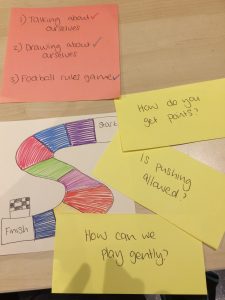I realise that so far, I haven’t mentioned one thing that is an essential and really valuable part of training to be an SLT, clinical placements. We’re lucky at City to be on placement pretty much all of the time we’re studying, so we have opportunities to apply what we’re learning as we go along. This isn’t the same for every uni offering this course, but for me it works, as I learn much better by giving something a go rather than sitting and listening…which is also an important part of how we learn….but that’s another story.
Since September, I’ve been on placement in mainstream primary schools in London. I guess something really important to mention here is that whilst we’re training, and when we’re on the job, maintaining confidentiality for our clients is essential, which is why I’m not going to tell you where in London I’m working. What I can tell you is that once I week, I meet my Practice Educator-or PE- who’s an experienced SLT, and I work with her/observe her/do some activities with the children she works with/sometimes even run a whole session by myself. This experience has been nothing if not a massively steep learning curve; partly because of the setting I’m in and partly because it’s given me a real taste for things that I’ll have to be doing every day once I’m qualified. Up to now, I’ve seen therapy mainly designed for children with a diagnosis of autism (which can affect their attention, turn-taking and language skills, among other things), children with Cerebral Palsy, two children with Down’s syndrome, a child with a speech sound disorder and children who are recovering from stroke. With such a huge range of needs, I’m seeing so many different therapy techniques and trying to figure out others that I can bring to the table, based on our teaching and up-to-date research of interventions that are being widely-used. I’m learning how to write case notes and reports, grade assessments and take speech samples from children. My conclusion: there is A LOT to know.
It’s taken a while to get my head around therapy session structure and commonly used methods of intervention that can be adapted for different children; where every day is different, there are loads of different opportunities. The picture is some of the resources I recently used for a session, in which I was working with a boy who is having difficulties with playing football in the playground, so I used a homemade board and some questions to help him talk about accepted behaviours. For him, this is one of the main goals in therapy; helping him to be more integrated with other children at school, and these goals are different for every client. A lot of what we do is pretty good fun, but at the end of the day, my brain feels saturated and I am totally knackered! My clinical tutor (the City staff member who is assigned to look after us whilst we’re on placement) assures me this is totally normal. Alongside the intervention work, we have to complete written assignments and a video which will be used for a clinical exam in April: this is where we film ourselves doing therapy with a client, analyse it and present a report on it to our examiners.
I’ll be working in this setting until the end of March, and be on a different placement in June for a whole month, after we’ve finished our exams. I’m hoping for an adult or adolescent placement, particularly in youth or adult justice….so, yes, that means working in a secure unit with offenders. However, this depends on the SLTs who make offers to have students where they work, and this is pretty unpredictable. Until then, I’ll mainly be playing lots of board games and rolling lots of colourful balls/doing activities with soft toys and picture books….is it like work, honest.




Recent Comments